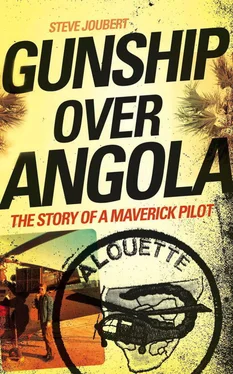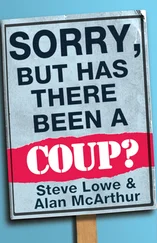The gunships were already on the way in to the target when suddenly Telstar interrupted proceedings with an instruction that went something like this: ‘Shotgun formation, this is Telstar. You are to immediately break off the attack on the convoy and return to the HAA.’
‘What?!’ said one of the Alo gunship pilots. ‘These okes have been shooting the kak out of us and it’s payback time!’
Someone else then said, ‘There is a lot of interference and we can’t hear you, Telstar.’
Telstar, urgency and tension apparent in his voice, shot back, ‘Shotgun formation, I repeat, you are to break off the attack… I repeat… you are to break off the attack immediately!’
‘No fucking way are we letting these fuckers get away!’ someone said, echoing the thoughts of all 12 gunship crewmen.
‘I know that you can hear me and this is an order. It comes from the highest authority in the land! Please stop the attack and go back to the HAA!’ the concerned pilot in the Telstar pleaded.
A minute or so of stunned silence ensued as the leader of our formation led the gunships around the convoy in a wide circle but without firing at them. Then the lead chopper veered off to the west and the rest of us reluctantly followed.
The silence must have caused some degree of consternation all the way up the chain of command, as, every 20 seconds or so, the Telstar asked, ‘Shotgun formation, have you complied? Please respond. Have you complied?’
It took a long time for the lead chopper to respond in the affirmative.
*
In the debacle that was Cuamato and its aftermath, I came to accept that the intensity of the Border War was escalating noticeably from operational tour to operational tour. From the middle of 1980 things escalated rapidly, and by mid-1981 the deployment of ever more sophisticated weaponry, particularly by FAPLA and PLAN, backed by the Eastern Bloc and Cuba, made the relatively safe operation and battlefield dominance of the Alo III gunship – which was, after all, only a converted Alpine rescue helicopter – a decidedly more perilous proposition.
From my point of view, 1981–1982 saw our aircraft being hit by enemy fire a lot more frequently than before, and there were fewer and fewer rest days back at Ondangs. There were more and more ‘sleep outs’ in places that were decidedly more hostile, with the number of joint operations increasing by the month, and with gunship crews having to work out ever more improved techniques and tactics to evade the sharp end of the enemy’s opposition to our presence in southern Angola.
Until Cuamato, South Africa still adamantly maintained that our beef was with SWAPO and its military wing, PLAN, and not with the Angolan MPLA government or its armed forces, FAPLA. I don’t know if I ever heard an official pronouncement of the rules of engagement for the SAAF when it came to FAPLA, but I, like all the other aircrews, was under the impression that if they shot at us, then we were entitled to shoot back.
Cuamato and its aftermath changed that. Despite the 1984 ceasefire agreed as part of the Lusaka Accords, the Border War soon resumed. The SADF continued to intervene in southern Angola, often in support of UNITA. Contact with PLAN was different, in that it had a stated objective to destabilise and attack targets in South West Africa, and South Africa had a duty to protect the citizens of that territory. Now that is about as deeply as I am prepared to go in discussing the legitimacy of South Africa’s presence in the region.
At the time I firmly maintained, as I still do now, that the reason I became involved as a participant in the conflict was to forge an aviation career for myself. As my family lacked the means for me to fund this venture privately, the only really effective route open to me was through the military. I had always been resolute in the idea that, when I had accumulated the necessary hours, qualifications and experience to fly commercially, I would resign my commission and leave the SAAF.
By mid-1981, I realised that I still had quite a way to go to fulfil the minimum criteria for a career in the commercial flying industry. Though I had accumulated enough pilot-in-command helicopter hours, I was still well short of the mark where fixed-wing hours were concerned, and that was where, I believed, my future lay. Although I was reluctant to do so, I began to make discreet inquiries about moving away from the chopper environment and into the multi-engine transport fold as soon as the opportunity arose. It took almost another full year before I made the switch, and it took a change of command at 17 Squadron to help to accelerate my move.
My last year as an Alouette pilot was one of seemingly endless bush tours, a year in which too many friends and colleagues succumbed to the escalating hostilities, and a year in which I withdrew even further from the mould of the ideal military man.
Other factors also came to a head after Cuamato. The sentiments planted by Atie and others during the 1980 skiing holiday began to take root. As time went by, I found it more and more difficult to resist the instinct to question. After I got married I also felt it was unfair to subject my wife to the extraordinary stresses brought about by my frequent forays into the bush. I felt increasingly isolated, both at work and socially, without recourse to any form of support or understanding, even from professional counsellors. In fact, seeking counselling from anyone, amateur or professional, loved one or associate, was banned outright by the authorities and dire consequences were threatened for anyone found to have broken this rule.
I felt the need to watch my back more and more as my disdain for the apartheid government and its addicts became increasingly apparent and impossible to conceal. This is not a good thing when you are dependent on others, as occurs in combat.
*
Towards the end of 1981, I was sitting at a table in a crowded Durban restaurant having dinner with a very dear aunt when she asked me how I was coping with the death of my mom. I replied that I was still angry with my dad, whose behaviour in the years prior to Mom’s stroke had, I felt, placed her under the extreme pressure that had led to the fatal crisis.
My aunt stared at me contemptuously for a few seconds, and then she leant across the table and slapped me hard across the face.
‘You arrogant little bastard,’ she hissed. ‘Do you not know that your mother never slept a wink while you were in the bush? How do you think that affected her health?’
Up to that point, I’d never considered that I could have played any role in contributing to the rocketing blood pressure that had so cruelly taken my mom’s life. My aunt’s words and actions sent my mind into sudden shock. When I look back now, that incident in the restaurant opened the first tiny breach in my carefully constructed emotional defences and gave rise to a growing consciousness that ultimately put me on the path to leaving the SAAF.
But, mostly, I think I wanted out because at heart I sensed that I was and am a creator, a builder, perhaps even an idealist.
But I am not a soldier.
As I have got older, I have become a greater and greater pacifist and an avid supporter of conversation instead of confrontation. Yet, ironically, I am prepared to fight to the death, if necessary, to ensure that none of my children or grandchildren will ever have to experience the true horror of war.
I am now 60 years old. After leaving the SAAF in 1985, I abandoned aviation as a career and focused on building businesses instead.
The events described in this book happened almost four decades ago and, naturally, had a profound effect on my life. If I bear any grudge at all, it is against the military establishment, not for moulding me into the fighting man that I became for ten years by intentionally placing me in situations that required me to close down emotionally, in order to survive the experience, but rather because they blatantly shirked their responsibility to switch me back into a balanced, considerate and compassionate human being when my fighting days were over.
Читать дальше












